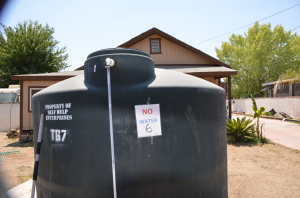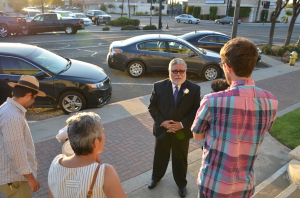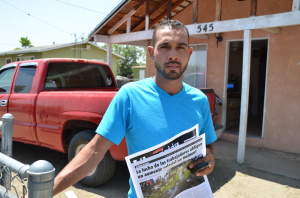
Earlier this month, the Party for Socialism and Liberation sent a group of militant journalists from San Francisco and Sacramento, along with PSL presidential candidate Gloria La Riva, to investigate California’s deepening drought crisis.
The Central Valley is impacted the most by drought conditions, yet is also one of the largest agricultural hubs in the United States, responsible for producing more than half of the country’s fruits, vegetables and nuts. Fueled by climate change and irresponsible drilling and distribution of available water, California’s years-long drought has left thousands without access to water in their own homes. One of the hardest hits regions in the Central Valley is Tulare County, specifically in the vicinity of East Porterville, just outside Porterville’s city limits. Liberation News spoke with workers and residents in the area who were directly affected.

The Frias family of Porterville was one of the first to receive a 2,500 gallon water tank in front of their house after they met the same fate of countless other homeowners who saw their wells run dry. “Many people’s wells went dry. You can drive up and down the street and see who has water and who doesn’t,” commented Sergio Frias.
Before the Frias’s were provided a small tank to store water, they were forced to turn to their neighbors for help, and even with the tank installed they have not been told if the water is safe to drink, so they also have to use bottled water separately.
Sergio told Liberation that state officials from Sacramento had visited the region, but did not take the time to see the struggle of the residents. “When these people were supposed to drive through and see the community, one of my friends works for the transit and he actually drove these politicians around, and said that they didn’t even come out this way,” he said.

Helping the community
With little help coming from the state and federal government in what is clearly an emergency situation, the task of providing aid for families and others without water for the Porterville community was taken up by Pastor Roman Hernandez and the Iglesia Emmanuel Church. From last November up until a week and a half before Liberation arrived on the scene, Hernandez had been working tirelessly for seven days a week to give water and some food to those who could make the trip, and also provide access to showers and bathrooms that had been set up in the church’s parking lot.
Unfortunately, many in the community are undocumented and fear the racist immigration system to the point where they won’t reach out for help. Hernandez reflected that the water crisis has affected “At least 10,000 people. There are a lot of people that nobody has counted. There are families who are invisible and nobody is taking their story into account…They’re afraid that their information will be given to the police, to immigration. I’ve had to beg people to use the facilities. The showers we have at the church are averaging 40 people a day. There should be 300, 400, 500 people on a daily basis if you take into account that we have at least a thousand people on just the east side of Porterville.”
The pastor was recently relieved of the burden of providing water by CSET, a non-profit which took command of the operation, but with the new leadership came new restrictions on who has access to the aid. Because residents of the city of Porterville still maintain access to drinking water, they are prevented from receiving aid, reportedly because the donors only wanted help to be given to people that don’t have water. This was not welcome news to Pastor Hernandez, who said, “We have families living within city limits that have running water, but they’re living off social security checks, very limited income, and yet just because they have running water they’re not going to get help.”
Non-profits and corporate donors dictating who is or is not in need of assistance reveals a corrupt system with a lack of accountability to the people on the part of state and federal officials. “There was something like $18 million for the drought relief but most of that money went elsewhere. I’ve been calling Porterville the Ground Zero of the drought, but very little money has come to this area…The federal government should be in Porterville right now…The Governor needs to come to Porterville. They should be walking up and down those streets. It’s unbelievable that this is going on in the United States of America, especially in California. You’ve got to see the faces of these people, of these families,” remarked Hernandez.
The ruthless dog-eat-dog mentality of the capitalist system has pitted giant agribusiness against poor and working people in a race to extract what groundwater remains in the Central Valley. Instead of growing sustainable crops to meet people’s needs, many of the largest farms are growing water-intensive foods like almonds, which can then reap giant profits in markets outside of the United States. These profits come at the expense of finding a safe and sustainable infrastructure to provide water for the people of California.
Water table dropping a foot a day
Liberation received a tip about a water well drilling operation taking place and spoke with Billy, one of the workers on the drilling rig. He said that the well was being drilled for a farmer and not for any sort of domestic use, and then went on to describe the effects of the race for water and how “The water table is dropping about a foot a day, so we have to drill deeper. All the wells around here are dried up.”
While agribusiness can afford exploratory drilling, the thousands of dollars it costs to put in a well is not feasible for the average person, let alone the farm workers on these plantations who remain in a position of super-exploitation. In front of his home, situated south of Porterville, farm worker Jorge Meza explained to Liberation how the drought impacted his occupation: “The work I do is harder, and we have to work more hours. So yes, almost always the workers from the field are the ones most affected, those who make very little money. But we have to work and we have to do something in order to eat.”
The vast majority of California’s water is going to help the maximization of profit for big agribusiness, heavily subsidized by the government. Gloria La Riva had this to say about the situation: “Our view is this. The water belongs to everyone, but the agribusiness has been sucking it out and endangering the population. There’s no limit to what they grow, and then they push their product. We don’t need to have almonds in every meal, but they do it for their profit, and they don’t have any concern about the community, so we think that the water and people’s needs for water should come before anything else.”
There are a number of measures that can be taken immediately to address the water crisis. First, the federal government should declare the situation to be a natural disaster and begin assisting people and their families who wish to relocate, while at the same time provide a living income to farm workers and others out of a job as a result of the drought. All subsidies should be suspended for agribusiness which fuels water waste, while also preventing companies like Nestle from continuing to extract and bottle water in the state. On top of its five bottling plants throughout California, Nestle continues to pump water out of the San Bernardino National Forest on a permit that expired 27 years ago, paying only an absurdly-low annual fee of $524 to do so.
Any further deep-water well drilling for agribusiness should be prohibited and water delivery should be mandated to all families regardless of citizenship status. It should be illegal for landlords to rent out homes without adequate water infrastructure and enforcement should be strict. Firefighters in Porterville had said that many landlords refused to provide water once there were problems, because often it would cost more for them to do so than the cost of the entire home. Once again, this is a situation most severely impacting the poorest and most vulnerable people in the community.
The Party for Socialism and Liberation’s 2016 presidential campaign recognizes that the California water crisis is a capitalist-made disaster which reveals the urgent need for socialism, where a planned system of agriculture and water infrastructure could provide for the people’s right to safe, sustainable food and clean water. Get involved at VotePSL.org.





